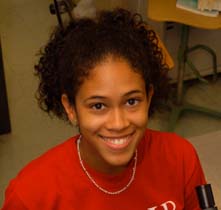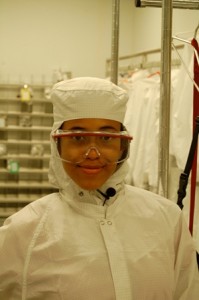Tell us a bit about your background
I was born in Panama and moved to the United States about 8 years ago. I come from a family of engineers and science and math lovers. I was always taught that the possibilities are endless, so I better take advantage of them. Therefore, I decided to major in Materials Science and Engineering at the University of Florida due to my curiosity, my love for math and science, my interest in engineering things, and the Gators. I hope to pursue my graduate studies in Biomedical Engineering and positively impact people’s lives.
What is the smallest thing that you can see with just your eyes?
Unfortunately, I haven’t been granted the opportunity to find out truly what the smallest thing that I can see is. Thus far in my life, the smallest thing I probably have seen is the eye of a needle.
What is the smallest thing that you can think of?
The smallest thing that I can think of is an electron.
When did you decide that you wanted to be a scientist?
Since I was a little girl I was always curious about what different things can do when interacting with other things. I wanted to know what happens if I mix things around my house. I was excited to see if I could find a cure for a disease. Maybe the mixture would do something cool. I remember one specific day when I walked around my house putting shampoo, ketchup, perfume, eggs, and other things around the house, into a cup, hoping I could invent something. Unfortunately, instead of inventing something, I just made a big mess and had to go out and buy more eggs because I had used them all. So, instead of making a big mess and getting in trouble for it, I decided to become a scientist so I can create something or discover something that can improve people’s lives.
What do you like about science?
What I like about science is that a lot of things that are unknown can be discovered through science.
But if they are unknown how do you know when you figure things out?
No one will ever know exactly if they have completely figured things out when they find something that has not previously been discovered. However, people will hopefully have a whole career ahead of them where they can discover and analyze aspects of this new thing.
What do you not like about science?
What I do not like about science is that not one single person can learned and discover all there is to learn and discover in the universe.
Are all your friends scientists?
Most of my friends are scientists. Most of my friends are engineers and like science. Some of my friends and I have a lot of the same classes because we are interested in the same things.
When you are hanging out with your friends, do you talk about science or other stuff?
When I am hanging out with my friends, we do talk about science and school in general. Most of the time since my friends and I have the same classes, we’ll come out of class still discussing the material that was presented and we’ll share our own views on the subject. Sometimes, we’ll relate things that are happening to us, to something we learned in class.
Like what can you give us an example of something relevant to what you are learning in school?
An example of something relevant to what we were learning in school was when we were learning about batteries in our Chemistry class. After class, we were discussing how some of the Dell batteries were recalled because they were not working properly. Chemistry became a lot more interesting when we could understand the chemical aspects of batteries and how they work.


